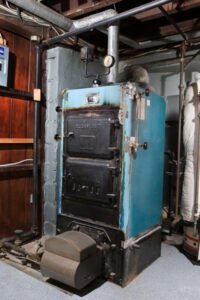If you’re asking this question, you’re either curious or you’ve noticed signs of corrosion on your home’s gas furnace. The simple answer is that gas furnaces can rust and many eventually will. It’s not something you want to happen and when it occurs it usually means it’s time to schedule a furnace replacement in Hillsboro, OH. Learn more about how old is too old for a furnace to help you decide if a replacement is necessary.
Why do furnaces rust when they don’t use water to generate and distribute heat? There are some interesting answers, and this knowledge can help you with preventing an early retirement for your gas furnace.
The Presence of Water Vapor in Gas Furnaces
Although gas furnaces don’t use water, that doesn’t mean they’re free from water vapor and moisture. The combustion gases the burners create contain some levels of water vapor—it’s impossible to escape the presence of water. When the combustion gases cool down inside the heat exchanger as they lose their heat to the air outside the walls of the exchanger, the gases condense into vapor.
In a standard gas furnace, this vapor (along with other byproducts like carbon monoxide) escapes out of the furnace and the home through a flue. In a high-efficiency condensing furnace, the vapor moves to a second heat exchanger where it goes through further condensing to release additional heat. The remaining moisture then exits the furnace.
Combustion Gas Vapor and the Aging Furnace
Although gas furnaces are designed to effectively remove their combustion gas vapor as fast as possible, the vapor will still chemically react with metal parts of a furnace such as the walls of the heat exchanger. Over time, these reactions will cause corrosion to start. This is one of the reasons we caution people about pushing a furnace over its estimated service life.
After 15 years, it becomes more likely that the chemical reactions will create rust—and rust on a heat exchanger is potentially dangerous as it allows the heat exchanger to crack and toxic gases to escape into the air. If you see rust on a furnace that’s more than 15 years old, it’s time for a new furnace.
Faulty Venting
The corrosion process will speed up if the furnace isn’t adequately venting exhaust through the flue. The vapor will have more time to react to metal because of poor venting. Issues with furnace venting often occur because of neglected maintenance or a broken draft inducer that doesn’t pull combustion gases up the flue.
Leaky Air Conditioning System
Many homes have their gas furnace and air conditioner stored in the same cabinet so they can share the same blower fan and ventilation system. The air conditioner is housed over the furnace, so if the AC’s condensate pan starts to leak, it will allow water to drip down onto the furnace and threaten to cause rust. Always stay on top of air conditioning maintenance and repairs because they help protect your furnace as well. If you’re unsure whether to repair or replace your air conditioner, our guide to when to
As we mentioned above, you never want to see rust on your furnace. Call our experts to see what’s wrong, and we’ll help you make the choice about the best next step for your heating system. If you’re struggling with frequent issues, it may also be worth considering when repairing your heater is no longer worth it.
Shafer Heating & Cooling, LLC: You are just one call away from the comfort and savings you deserve!

